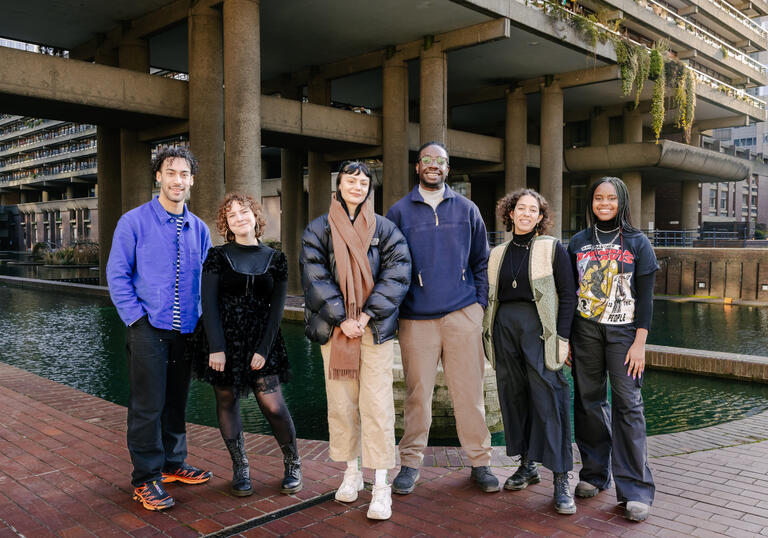
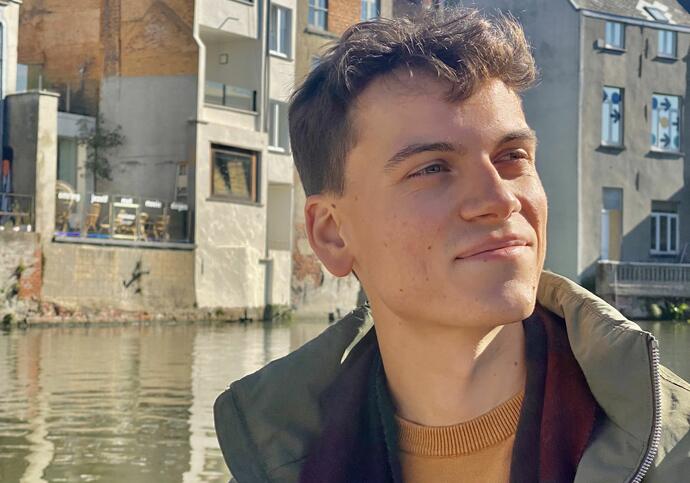
Gabriele
I’m a theatre-maker and producer interested in multidisciplinary and documentary work. Since 2020, I’ve been running Undone Theatre, a queer- and migrant-led company platforming marginalised stories through formal innovation, which has been supported by Arts Council England, VAULT Festival, Queercircle, and others.
Why did you apply to be a Young Changemaker?
I’ve found being an emerging artist extremely unsustainable, due to unreasonably high competition, low salaries, and constant funding cuts to the arts — with those coming from underrepresented backgrounds facing the biggest challenges. I was keen to see what an institution like the Barbican could do for a young artist like me; and so I applied to be a Young Changemaker. This programme empowered me to ask difficult questions of the most senior staff at the Barbican and provided me with the necessary support and training to change this organisation for the better from the inside.
What was your experience of the Young Changemakers Programme, and what impact do you hope your recommendations will have?
It was refreshing to hear senior Barbican staff talk candidly about huge challenges that they and the whole arts sector face in 2023. It made us realise that we were being asked crucial questions and that we had real power to make a change—it’s been a huge learning experience as both an artist and audience member. After months of conversations and research, we put together an ambitious proposal for the Barbican to give some of their programming and producing power to grassroots arts organisations. The goal is for the Barbican to learn from other companies coming into the building to create new, exciting programming in an accessible, multidisciplinary space, which will be integrated into the plans for the architectural renewal of the building. I hope this kind of support can make it easier for emerging artists and companies to find their footing in the London arts landscape!
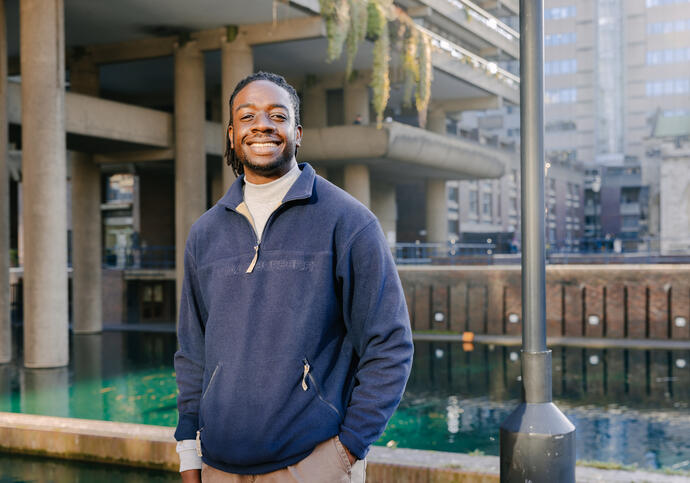
Jordan
I'm a cultural producer and community organiser in East London. Since getting involved with arts and culture at a young age I have been fascinated with its ability to be used as a vessel for change and innovation within communities.
Why did you apply to be a Young Changemaker?
I joined the Young Changemakers with the hope of developing my relationship with collaborative change and understanding of the arts from a business point of view. I have aspirations to one day run my own arts and culture projects for young people and underrepresented groups, and to get to that place I really need to understand deeper systemic and inclusivity issues that exist in the creative industry.
What was your experience of the Young Changemakers Programme, and what impact do you hope your recommendations will have?
Personally, I've found the process of experimenting with ideas among peers to be hard but rewarding, and this process hasn't been a linear one or predictable one either. Which is not uncommon when co-producing a project with various partners and team members. However I think that this is what makes the process all the more enriching.
With the recommendations I've made I'm striving for change that is sustained and makes a positive impact on D/deaf and disabled people who have felt isolated from the mainstream arts experience and hopefully this is just the beginning of the journey for arts institutions to develop engaging methods of inclusivity to reach wider audiences in London and beyond.
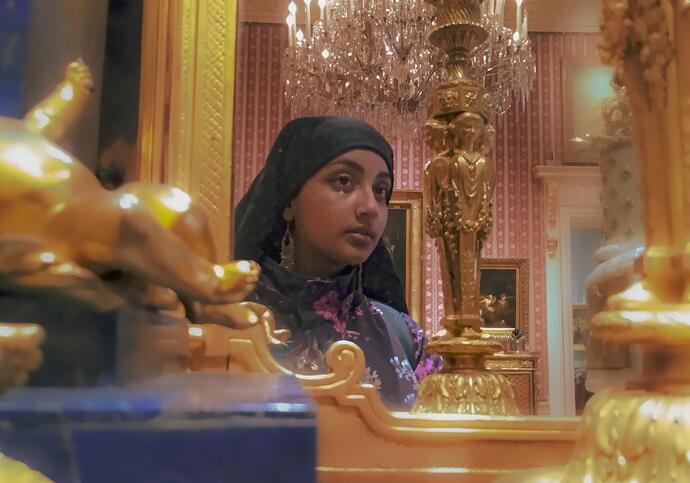
Khadija
Alongside my undergraduate studies in Arts and Sciences, I have worked as a community events producer, collaborating with organisations such as LIFT festival and The Old Church. As a co-founder of the Lost Blocks Collective, my passion lies in changing the narrative and platforming otherwise unheard voices. I also have a love for conducting social research and work part-time as a mental health workshop facilitator.
Why did you apply to be a Young Changemaker?
Young Changemakers stood out to me as a unique opportunity to drive meaningful initiatives that amplify the voices of systematically excluded young creatives and advocate for spaces that allow for them to flourish and be celebrated. It was my first encounter with such an inspiring program, connecting me with other incredible young changemakers who share the same aspirations for driving positive change.
What was your experience of the Young Changemakers Programme, and what impact do you hope your recommendations will have?
Throughout the process, I have had the privilege of connecting with various departments across the Barbican, gaining a deeper insight into their operations and future plans. It has been an exclusive opportunity to gain a behind-the-scenes view of the building and programme development plans, and I am grateful to have been given the chance to provide input and engage in discussions regarding these developments. The feedback and support from senior leads and board members regarding our own proposals have been invaluable, and it has been evident that they genuinely care about the contributions we have to offer.
Our recommendations encompass various aspects such as youth engagement, grassroots organisation involvement, accessibility, anti-colonialism, and innovative utilisation of upcoming spaces. I firmly believe that these recommendations will be transformative in creating a more inclusive and dynamic Barbican that resonates with and serves the diverse needs of its community.
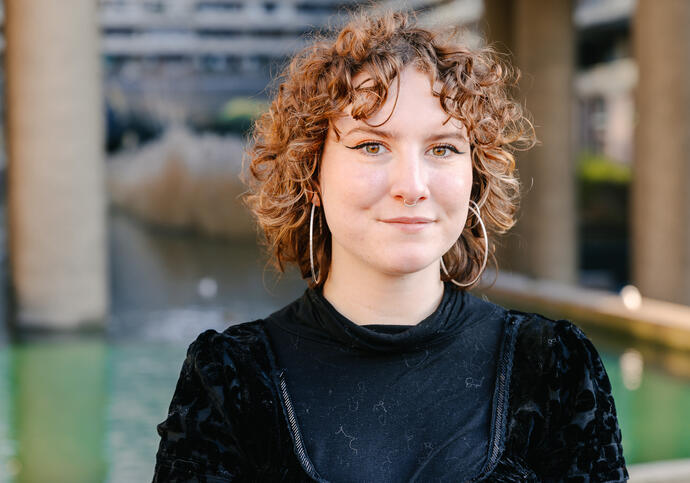
Maisie
I'm currently working in communications and visual merchandising, with previous experience in the performance and fashion industries. I care deeply about the arts and spend most of my time either consuming or creating art in one way or another. I believe that art harnesses the potential to radicalise and enrich society, and that’s why it’s so crucial for the art world to actually be representative of the world around us.
Why did you apply to be a Young Changemaker?
There is an artist in all of us and the art world is improved greatly when diversity, life and community is breathed into it. A lot of the work I have done has focussed on making the arts and workplaces more accessible, radical and nurturing, a passion that in part was formed by my own lived experience and subsequent non-traditional entryway into the arts. The opportunity to work alongside such an iconic institution on this project has been incredible.
What was your experience of the Young Changemakers Programme, and what impact do you hope your recommendations will have?
Our working process was very holistic and thorough. We all did a lot of research and spoke with everyone we possibly could to come to our conclusions. Everyone on the project came from quite different pathways in the arts, and as such we all had differing views, dreams, and had faced different challenges. This greatly helped us in the formation of our work. We all had something different to bring to the table and we were united and passionate in our vision for a radical, fairer Barbican. It was an environment that was equal parts caring and challenging, and it was invaluable to work alongside my inspiring peers.
I hope the recommendations will contribute towards a rethinking of how arts venues are run, and that Institutions will realise that actualising their spaces as a kind of commons - truly for the community rather than being driven by profit - will create better, more fruitful art that truly benefits all.
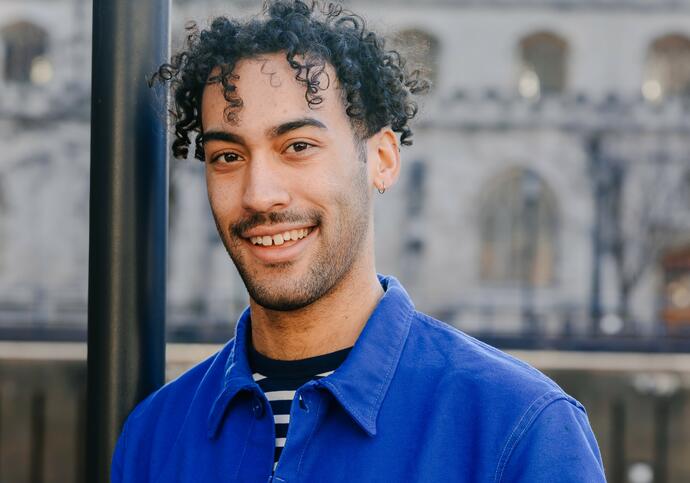
Peter
As a poet, I explore ecology and ventriloquy. I’m particularly interested in the Caribbean oral tradition. Alongside my creative practice, I’m a freelance curator and graduate student in History of Art and Architecture. I have written for Burlington Contemporary and am a New Narratives awardee at the Paul Mellon Centre. In March 2022 I curated Intimacies, after Vallotton, at the Old Fire Station.
Why did you apply to be a Young Changemaker?
An interest in contemporary art has brought me to the Barbican a number of times over the years. I was eager to join the Young Changemakers programme because of how much I had enjoyed visiting the centre’s galleries. The Barbican’s iconic architecture felt like a fascinating context to display and think about art within. Learning how a cultural venue as bustling as Barbican worked seemed like a great opportunity to develop an early career in curation and contemporary art.
What was your experience of the Young Changemakers Programme, and what impact do you hope your recommendations will have?
I have had an extremely positive experience as a Barbican Young Changemaker, gaining insight into the skills involved in institutional change. Working on the Barbican Renewal recommendations, I began by researching accessibility and outreach initiatives in the arts and heritage sector. I learnt about tangible and intangible barriers to access. We spoke a lot about the extractive power dynamics that Barbican is at risk of perpetuating as an influential cultural monolith. I hope that my recommendation, the creation of a Barbican Anticolonial Group, will address this risk. Acknowledging the Barbican’s situation in the City of London and its historic connections to the British Empire is about cultivating a culture of openness and reflection. The impact of this anti-colonial initiative will be to hold future, more experimental programming accountable, encouraging equality in all of the Barbican’s outreach efforts.
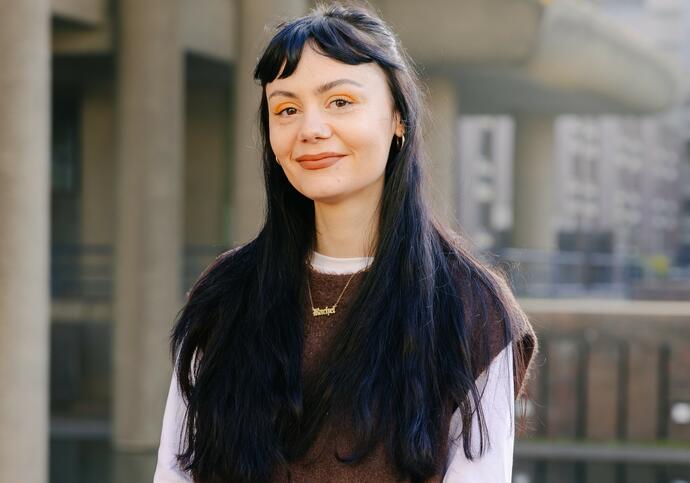
Rachel
I’ve been working in the creative industries for five years, and while it feels like there’s always a want to change on an individual level, organisational structure allows little room to grow. By joining the Young Changemakers, I wanted to push and redefine the Barbican Centre’s attitude to access and inclusion from the ground up.
Why did you apply to be a Young Changemaker?
I was keen to learn more about policy, particularly regarding young people, emerging artists and those with disabilities. As external consultants, it felt important to advocate for the venue’s visitors, providing a line directly from audience to senior management. Putting philosophical ideas and ideals into written proposals, and thinking about the tangible way these ideas will impact future creatives, has been enlightening, frustrating and generative.
What was your experience of the Young Changemakers Programme, and what impact do you hope your recommendations will have?
The process of learning about the Barbican Centre, speaking to staff, visitors and creatives, and formulating our recommendations has been a mixed experience. I think it’s easy to come into a large arts organisation, point out lots of things which don’t make sense to you, scratch your head and shout ‘change!’. By speaking to staff and long-time audience members, I’ve learnt that there is almost always a reason for something, even if that reason is now outdated. The issue comes when everyone is comfortable with the roundabout way of things, the that’s-just-the-way-things-are of it.
I hope that our recommendations allow for new ways of thinking, for utilising the building so that emerging creatives and audiences feel that they have a say over the work which is developed, the people who are prioritised. Most of all, I hope that new visitors can feel at home here. I look forward to seeing new connections forged in unexpected and brilliant ways.
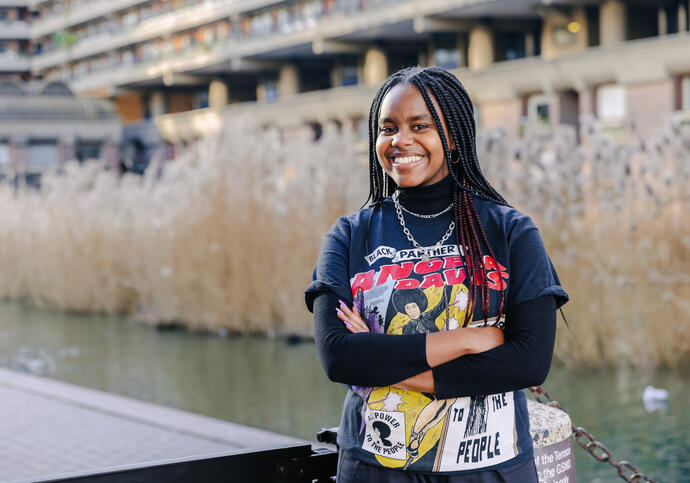
Wanjikû
I’m an Afro-cultural commentator - focused on exploring black cultural moments which range from significant popular events (such as Kendrick Lamar’s ‘Mr. Morale and the Big Steppers’) to conversing with upcoming African stars within their respective fields (including an interview with Thando - a South African musician).
Why did you apply to be a Young Changemaker?
Joining this process felt like the necessary challenge in ensuring the written work I was engaging with had a space to be implemented within established art spaces. Nonetheless, finding community within my creative practice is an aspect that was severely lacking and I knew this process would help in facilitating that, which it has done so gracefully.
What was your experience of the Young Changemakers Programme, and what impact do you hope your recommendations will have?
Challenging in an extremely rewarding way. The process of creating recommendations to the board was completely foreign to myself and thus daunting, however there was so much support available between us Changemakers as well as with our facilitators which meant we could intentionally execute this process to the best of our abilities. Through the multitude of conversations we had with a variety of Barbican stakeholders, the process was equally enjoyable due to all the exceptional insights we managed to acquire. My hope is that the marginalised groups who we have centred our work on assisting, shall feel a seismic shift within the Barbican eventually throughout the course of our recommendations being implemented.
